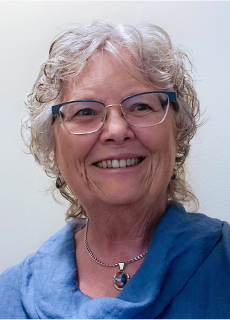Prof. Catherine Bell receives honorary degree from the U of A
Carmen Rojas - 18 June 2024

University of Alberta Faculty of Law Professor Emerita Catherine Bell is being recognized with the university’s highest honour. As part of Spring Convocation, Bell will receive an honorary doctor of laws degree on June 18.
“There are many people who have received this honour from the University of Alberta that I admire – mentors of mine like Justice Sheila Greckol and Elder Elmer Ghostkeeper,” Bell says. “I’m incredibly honoured to be among those people, and that the university feels I’ve made a difference.”
"It is an exciting and proud moment for the Faculty of Law to see Professor Emerita Catherine Bell receive an honorary degree from the University of Alberta,” says Dean Barbara Billingsley. “As a valued member of our faculty for more than 30 years, Catherine led the way in establishing Indigenous law, policy and practice as a key part of legal education at the University of Alberta and across Canada. She also played a key role in creating experiential courses that, to this day, continue to provide our students with opportunities to engage with the practical application of the law, particularly in regards to individuals from marginalized communities.”
“Everyone who has worked with Catherine during her tenure at our faculty knows that she is someone who lives her passion and commitment to advancing the rights of Canada's Indigenous people. She is, in short, an inspiring and deserving recipient of an honorary degree."
Bell traces her passion for human rights back to her years as a teenager attending boarding school in Regina, Saskatchewan, where she recalls being “overcome” by the discrimination she witnessed towards Indigenous peoples and people who came from low-income backgrounds.
While pursuing an LLB from the University of Saskatchewan in the early 1980s – one of the few universities at the time to teach a course in Indigenous rights – Bell met instructors, Elders and mentors who opened her eyes to the law’s treatment of Indigenous peoples as one of the most significant human rights issues in Canada.
Driven by a desire to bring about change, Bell joined the U of A Faculty of Law as an assistant professor in 1989 and became the first full-time faculty member to focus on Canadian law in relation to Indigenous peoples.
One of the initiatives Bell helped create during her three decades with the Faculty of Law was a special program that encouraged the admission of Indigenous students by providing them with academic and cultural support. Over the years this program evolved and today continues through the work of the Faculty’s Indigenous support officer and the Wahkohtowin Law and Governance Lodge.
“I’m very happy to say I’ve seen approaches to what we started 30 years ago differ, improve, and become even more successful in accomplishing what we wanted to achieve,” she says.
Bell also helped develop experiential learning opportunities that enable law students to have a direct impact on the community, particularly in supporting vulnerable populations. These include both the Low Income Individuals and the Law clinical law course, which she taught with Katherine Weaver and which runs in partnership with the Edmonton Community Legal Centre and Legal Aid Alberta; and the Indigenous Justice Externship on Gladue Sentencing Principles which ran in partnership with Alberta Justice and Solicitor General and in collaboration with legal practitioners, community agencies and Gladue report writers.
Over the course of her career, Bell’s work established her as a leading expert in Indigenous rights, property law, cultural heritage law, the Alberta Métis settlements and Indigenous research ethics. She has used this expertise to help protect the rights and self-determination of Indigenous people, working in close collaboration with Indigenous communities and all levels of government.
A hallmark of Bell’s career has also been her unwavering commitment to Indigenous legal education. Her impact in this area has been far reaching: she assisted in developing and delivering programs across Canada, including the Program of Legal Studies for Native People (U of S), Akitsiraq Law School (with the University of Victoria), Nunavut Law Program (with the U of S) and the Banff Centre for Management, Aboriginal Leadership and Self-Government Program.
Bell admits that choosing to follow the road less travelled wasn’t always easy. She recalls, early in her career, being asked by a judge what “real” law she taught.
“I just persisted, and I had lots of great role models and mentors who showed me different ways I could affect change,” she says. “I tried to do that, and in some little way I have, but there’s a big journey ahead of us.”
“When I look back over the last 35 years, I think there's been amazing progress and I'm happy to say I've worked myself out of a job,” she adds. “There are outstanding Indigenous legal advocates, scholars, and academics. I now stand alongside them as an ally, as a rabble-rouser, as a supporter when called upon, but I no longer need to be a leader.”
As Bell prepares to accept her honorary degree and address the Class of 2024 as they start their legal careers, one of the messages she plans to share with them is the importance of collaboration and community.
“Nothing I ever achieved of any meaning or consequence I did on my own,” she says. “I had the faith and support of mentors, of students; I worked collaboratively with members in the justice and Indigenous communities. I made mistakes, I learned from those mistakes and people held me up and continued to walk beside me.”
“I would not be who I am without the people and community I have in my life.”